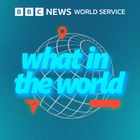
What in the World
Apr 9, 2024
On Monday, millions of people across Mexico, the US and Canada saw a total solar eclipse. That’s when the Moon moves between the Earth and the Sun, blocking its light.
But it’s not just eclipse-chasers who are excited. Scientists are too. They’re using the opportunity to study the Earth's upper atmosphere (known as the ionosphere), the Sun’s corona, and even animal behaviour.
So, could this solar eclipse could help unlock some of the secrets of our universe? Astronomer Jimena Stephenson and the BBC’s Laura Garcia explain.
Instagram: @bbcwhatintheworld WhatsApp: +44 0330 12 33 22 6 Email: [email protected] Presenter: Hannah Gelbart Producers: Emily Horler and Mora Morrison Editor: Verity Wilde
*In this episode Laura says Mexico last witnessed a solar eclipse in 1999. But it was in fact 1991.*

